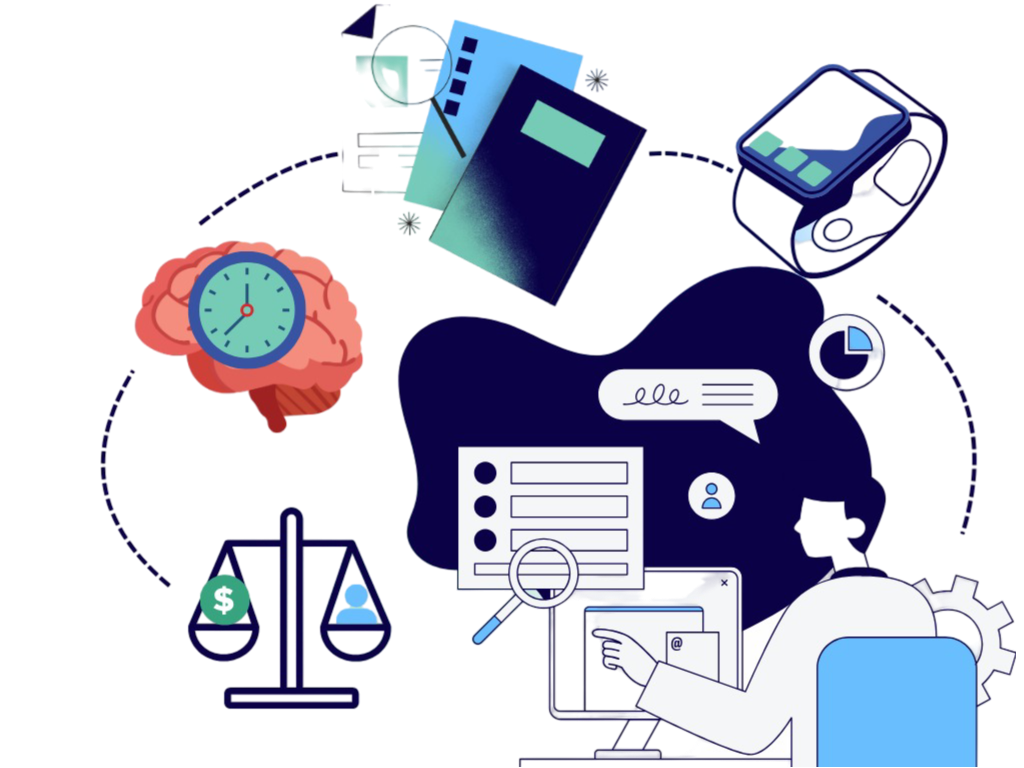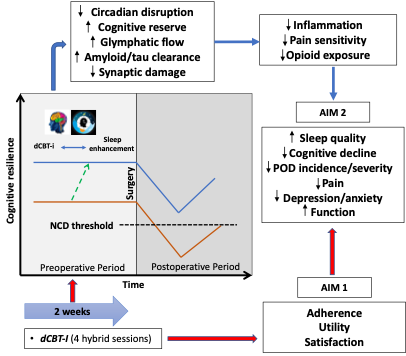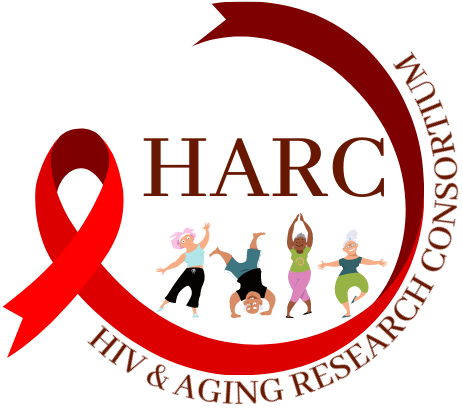
ReD-Lat Circadian Rhythm
In collaboration with the ReDLat Consortium, we investigate how circadian rhythm disturbances relate to Alzheimer’s disease and frontotemporal dementia in Latino populations.
- Sponsor: National Institute on Aging
- PI: Kun Hu, PhD.
Digital Sleep Optimization for Brain Health Outcomes in Older Surgical Patients (SLEEP-BOOST)
The primary goal of this randomized controlled trial is to test the feasibility and acceptability of preoperative sleep optimization (CBT-I) in orthopedic patients with moderate/severe insomnia. Secondary outcomes include cognitive, pain, and function.
- Sponsor: National Institute on Aging
- PI: Lei Gao, M.B.B.S., M.M.Sc.
- Co-I: Peng Li, Ph.D.; John Winkelman, M.D., Ph.D.

The SCOPE Trial: Sleep, Cognition, and Pain Bundle vs. ERAS-Cardiac for Postoperative Delirium
This multisite clinical trial investigates a novel approach to prevent postoperative delirium in cardiac surgery patients, combining sleep therapy, cognitive training, and pain management. We compare this comprehensive intervention against current standard protocols to improve outcomes for patients undergoing cardiac surgery.
- Sponsor: Patient-Centered Outcomes Research Institute (PCORI)
- Co-PIs: Lei Gao, M.B.B.S., M.M.Sc.; Balachundhar Subramaniam, M.D., M.PH, FASA

Sleep/Circadian Regulation and Progression to Postoperative Dementia

The goal of this grant is to test whether sleep/circadian regulation is associated with postoperative cognitive disorders, including delirium (POD), and progression to dementia within 12 months. It also tests whether the relationship is affected by AD genetic risk and AD pathology (plasma tau and amyloid).
- Sponsor: Alzheimer’s Association
- PI: Lei Gao, M.B.B.S., M.M.Sc.
Prediction of dementia in older adults using nonlinear EEG features
Using advanced artificial intelligence and large-scale sleep study data from over 8,000 older adults, we’re developing novel EEG-based biomarkers to predict dementia risk and monitor cognitive decline. This research aims to create a non-invasive, cost-effective tool for early dementia detection and treatment evaluation.
- Sponsor: National Institute on Aging
- PI: Shahab Haghayegh, Ph.D.
SleepInceptionNet: AI-Powered Sleep Stage Classification
We developed an innovative artificial intelligence system that can accurately classify sleep stages using just a single EEG channel. Unlike traditional methods that require multiple sensors and extended time periods, SleepInceptionNet provides real-time sleep stage identification, opening new possibilities for sleep monitoring and targeted interventions in everyday settings.
Circadian rhythm and sleep in caregivers of Latino dementia patients.

Caregivers of dementia patients frequently experience disrupted sleep and circadian rhythms. In Latino populations, where cultural values strongly emphasize family caregiving, caregivers often assume greater caregiving burdens and may experience greater sleep and circadian disturbances. This study aims to assess the severity of sleep and circadian disturbances in caregivers of Latino dementia patients and to investigate how these disruptions interact with those of dementia patients.
Improving Sleep Detection in Wearable Devices
Through industry funding support, this project aims to enhance the accuracy of sleep monitoring in wearable devices. Our research focuses on developing improved algorithms for sleep detection using data from ambulatory wearables, advancing the reliability of these increasingly popular health monitoring tools.
- Sponsor: Industry Funding

- PI: Peng Li, Ph.D.
Circadian Rest-Activity Rhythms in Women Aging with HIV
This research explores how circadian rest-activity rhythms affect cognitive function in women living with HIV, with special attention to menopausal influences. By studying both HIV-positive and HIV-negative women, we aim to better understand the relationships between circadian patterns, HIV, and cognitive health during aging.
- Sponsor: Brigham Research Institute

- Period: 2023–2024
- PI: Peng Li, Ph.D.
Circadian Rhythms and Cognition in People Living with HIV
This project investigates the relationship between daily activity patterns and cognitive function in people living with HIV. Using innovative data analysis tools, we study how circadian rhythm variations may influence cognitive health and explore the underlying mechanisms of this connection.
- Sponsor: HIV and Aging Research Consortium

- PI: Peng Li, Ph.D.
- Co-I: Kun Hu, Ph.D. Monty Montano, Ph.D.
Circadian disturbances and cognitive impairment in people living with HIV
This research explores how disruptions in daily biological rhythms may contribute to cognitive challenges in people living with HIV, aiming to understand the relationship between circadian regulation and brain function in this population.
- Sponsor: Harvard University Center for Age Research

- PI: Peng Li, Ph.D.
- Mentor: Kun Hu, Ph.D. Monty Montano, Ph.D.
Circadian regulation, autonomic function, and Alzheimer’s disease
This research investigates how disruptions in daily biological rhythms and autonomic nervous system function may influence the development and progression of Alzheimer’s disease. Using advanced mathematical analyses, we study novel circadian and autonomic dysfunction markers to better understand their role in cognitive decline.
- PI: Peng Li, Ph.D.
- Co-I: Lei Gao, MBBS Kun Hu, Ph.D.
Daytime napping and Alzheimer’s disease in middle-to-older aged adults: Timing, irregularity, and interaction with genetic risks
This large-scale study examines how napping patterns may relate to cognitive health and Alzheimer’s disease risk in middle-aged and older adults. Using activity monitoring devices, we analyze napping behaviors in nearly 100,000 participants to understand their potential role in cognitive decline and dementia development.
Timing and irregularity of daytime napping and Alzheimer’s disease
This research explores the complex relationship between daytime napping and Alzheimer’s disease. We study how nap timing and regularity influence cognitive decline, and examine whether genetic risk factors for Alzheimer’s interact with napping behaviors to affect cognitive health over time.
- Sponsor: Alzheimer’s Association

- PI: Chenlu Gao, Ph.D.


